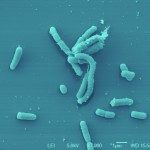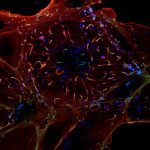About
My lab is interested in elucidating the activity of virulence factors from pathogenic bacteria so that we can gain novel molecular insights into eukaryotic signaling systems. The marine bacterium Vibrio parahaemolyticus is the worldwide leading cause of seafood-borne acute gastroenteritis. We are working on the two V. parahaemolyticus type 3 secretion systems (T3SS1 and T3SS2) and thei bacterial effectors to understand how signaling systems in the eukaryotic host can be manipulated by these bacterial pathogens. Each of the two T3SSs uses an unique repertoire of effectors to manipulate host signaling. The first T3SS1 is thought to be used to maintain V. parahaemolyticus’ survival in the environment, while the second T3SS2 is used for pathogenesis in an animal host. For decades, this pathogen has been studied exclusively as an extracellular bacterium. However, recent studies from our lab have revealed the pathogen’s ability to invade and replicate within host cells using the second T3SS2. These studies have elucidated novel evolutionarily conserved mechanisms that are used by both host and pathogen during infection. Our work at UT Southwestern is accomplished using a broad range of tools, including biochemistry, molecular microbiology, protein chemistry, structural biology, yeast genetics, cell biology and more.
Location
Building: Fernbach
Address: 25 Rue du Dr Roux, 75015 Paris, France





